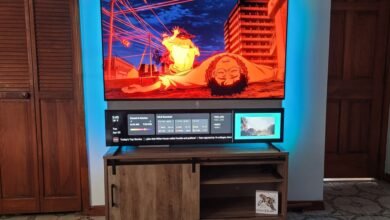Meta’s Metaverse Aims for Global Domination

▼ Summary
– Meta’s Horizon Worlds platform struggled with low adoption and quality, prompting internal criticism and a shift toward higher-quality content and developer tools.
– The company transitioned from in-headset creation to desktop tools and a new proprietary game engine to improve complexity, performance, and cross-platform compatibility.
– Meta is expanding Horizon Worlds to mobile and other platforms like Facebook and Instagram to attract more users, despite challenges in adapting VR games for phones.
– AI tools and mobile-only game development are being introduced to lower creation barriers and increase engagement, with mobile usage growing but still nascent.
– Meta aims to make Horizon Worlds a unified cross-platform experience, requiring simplification and potential deprecation of older features to expand its audience.
Meta’s ambitious push to dominate the metaverse hinges on transforming its Horizon Worlds platform into a universal hub connecting virtual reality, mobile devices, and social media. While the company’s recent Connect conference highlighted new Ray-Ban smart glasses, its broader strategy focuses on making immersive 3D social experiences accessible everywhere. Vishal Shah, Meta’s vice president for the metaverse, provided insights into how the company plans to overcome past hurdles and expand its virtual footprint.
Early versions of Horizon Worlds faced significant criticism, including from Shah himself, who noted in internal memos that even Meta employees weren’t enthusiastic users. The platform’s initial do-it-yourself creation tools resulted in simplistic, unappealing environments, famously illustrated by Mark Zuckerberg’s basic virtual selfie in front of a blocky Eiffel Tower. Shah acknowledges that the creative ceiling was too low to captivate users.
To address these issues, Meta shifted its approach in 2023, investing in higher-quality, professionally developed games like the player-versus-player shooter Super Rumble. The company also moved from in-headset building tools to a desktop application called Meta Horizon Studio, enabling developers to craft more detailed and engaging worlds using TypeScript. This transition supports everything from haunted houses to sports competitions, though it demands skills not all creators possess.
Artificial intelligence now plays a central role in Meta’s strategy to make world-building more accessible. At the Connect event, the company introduced AI tools that let developers generate 3D settings, non-player characters, and game mechanics through simple text prompts. The goal is to lower the barrier to entry while maintaining high-quality output.
Expanding beyond VR has been another critical focus. Meta began offering select Horizon games on mobile devices last year, recognizing that smartphones represent the largest potential audience. Shah admits the initial attempt to adapt VR titles like Super Rumble for phones stumbled due to poorly designed controls. In response, Meta now permits developers to build mobile-exclusive Horizon games, which has reportedly boosted engagement, though mobile usage remains modest compared to VR.
Shah emphasizes that the objective isn’t to create a separate mobile ecosystem but to enable seamless cross-platform interaction. He envisions users discovering Horizon experiences through Facebook’s games tab or Instagram, then transitioning effortlessly to more immersive VR versions.
Underpinning this expansion is Meta’s new proprietary game engine, designed to replace the Unity foundation the platform launched on. While Unity excels for standalone games, Shah explains that Horizon needed a custom solution to support massive, interconnected worlds. The Meta Horizon Engine allows more users to share a virtual space simultaneously and drastically cuts loading times. Research indicates that waits under seven seconds feel nearly instantaneous, a threshold the new engine aims to meet.
The engine will debut gradually, starting with environments like Horizon Central, the platform’s main gathering area, and Horizon Arena, its venue for live concerts and events. Soon, even the default home environment in Quest headsets will run on this new technology, reinforcing the idea that every space within Meta’s ecosystem is, fundamentally, “just a world.”
This philosophy extends across the entire platform: a VR comedy club, a meditation retreat, a Facebook mini-game, or a future augmented reality experience through smart glasses, each is a world within Horizon. Linking these diverse environments into a cohesive cross-platform network is an enormous undertaking, one that may require discontinuing older services and content to streamline the user experience. Shah confirms that Meta is actively evaluating which features to retire or consolidate, acknowledging that simplifying the ecosystem is essential for attracting a broader audience.
Ultimately, Meta’s metaverse vision depends on making Horizon Worlds the connective framework for social interaction across devices, even if that means making difficult decisions that could disappoint some early adopters. The company’s persistent investment in AI, cross-platform functionality, and proprietary technology signals its long-term commitment to shaping the future of digital connection.
(Source: The Verge)





